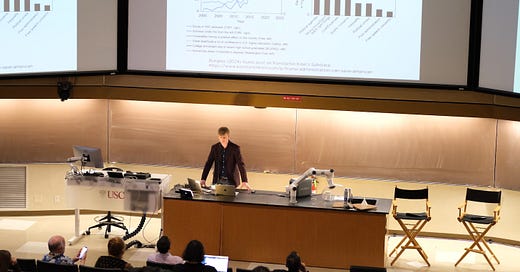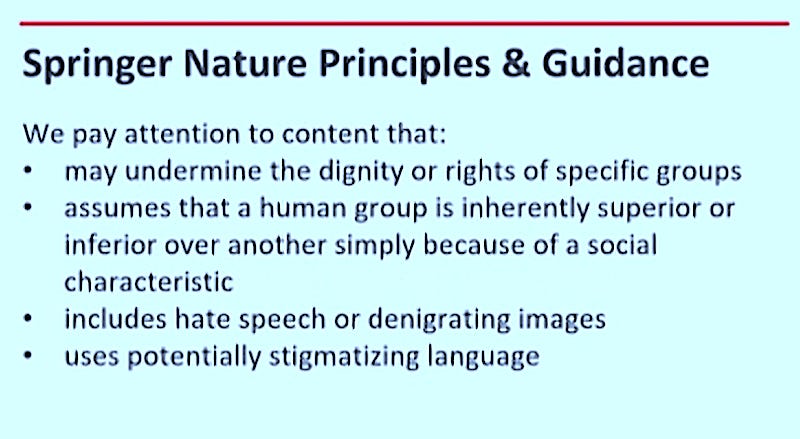Reporting Out from the “Censorship in STEM” Conference
Silencing, cancelling, compelled speech, retractions—folks had a lot to say.
First, a note from Team HxA: While the fires burning all around the “Censorship in Science” conference at USC this past weekend might have felt metaphorical, we realize they are all too real. Our thoughts are with the people of Los Angeles as they deal with this horrific tragedy.
As HxA was a major sponsor, I’ve been asked to give an overview of the “Censorship in STEM” conference in my column this week for Free the Inquiry—not an easy task, as contributors provided quite diverse disciplinary and personal perspectives on academic silencing, cancelling, language-policing, compelled speech, retractions enacted for one putative reason but really for others, and more.
Fortunately, recordings will soon be available from HxA so that you won’t have to rely on my or anyone else’s account to tell you what was said. The proceedings will also be published by the Journal of Controversial Ideas. (Disclosure: I serve voluntarily on the editorial board of JCI.) I’ll use this space to let you know when the recordings and proceedings are available. In the meantime, here are a few highlights I would note:
On Friday morning, Jonathan Rauch (who just joined HxA’s Board of Directors) gave the kick-off keynote, drawing from his book The Constitution of Knowledge: A Defense of Truth to remind those listening that “what we are defending” is nothing less than “humanity’s greatest accomplishment.” Noting that “a government not based in reality is a tyrannical one,” Rauch articulated three requisites for “a reality-based community,” namely free inquiry, a respect for facts, and viewpoint diversity.
Political context maps to the context of knowledge production, Rauch argued, and for that reason, he said, we need political freedom to conduct free inquiry, respect for the law in order to have respect for facts, and pluralism to support viewpoint diversity. He noted that meetings like this conference tend to draw people who have had bad experiences, including traumatic cancellations, and he said there is a tendency for these meetings to turn into gripe fests or even hate fests about how corrupt the American academy has become.
He then implored the audience to remember “there are still immense reservoirs of integrity” in the academy, calling it “the crown jewel of the human species.” He warned against calls to “burn it all down,” saying we should instead work on making it stronger.
Rauch’s prediction turned out to be prescient, although the personal accounts of cancellation did not overlap in a simple fashion with the (minority of) voices suggesting a kind of “burn it all down.”
Having myself interviewed and given solace and aid to many a cancelled academic (and having been through it a couple three times myself), I felt for the speakers providing witness. A few talked about how to move forward, with evolutionary biologist Carole Hooven, for example, lauding Harvard’s Council on Academic Freedom.
Hooven’s account of being increasingly isolated on Harvard’s campus as she was unjustly accused of transphobia and racism reminded me eerily of what E.O. Wilson recounted to me in 2009 about his treatment at Harvard following abuse at the pens of Richard Lewontin and Stephen Jay Gould. (Reflecting on the similarities of Wilson’s and Hooven’s experiences, in some ways I had to wonder how it took us this long to get to where we are in our awakening.) Hooven called on those present to work to connect campus-based groups like Harvard’s Council, the kind of engagement being achieved in part through HxA’s Campus Community Network and via individuals connected through the Academic Freedom Alliance.
There were definitely varied views at the conference on whether a new wave of legislation (including that anticipated at the federal level with the Trump administration coming in) will be helpful or harmful, though in my opinion there was too little discussion of legislative particulars. (For that, please do follow Free the Inquiry for news and smart analysis from our Policy team.)
Due to the fires, many who had intended to come in person instead joined by Zoom. Among them was Stavroula Kousta, editor of Nature Human Behavior, who explained that journal’s controversial “ethics guidance.” Those state:
Regardless of content type (research, review or opinion) and, for research, regardless of whether a research project was reviewed and approved by an appropriate institutional ethics committee, editors reserve the right to request modifications to (or correct or otherwise amend post-publication), and in severe cases refuse publication of (or retract post-publication)[.]
In other words, a paper could pass peer review with flying colors and still be stopped by publisher Springer Nature’s paid staff for violating their views on race, gender, oppression, and so on.
Above: A screenshot from Kousta’s presentation.
This isn’t theoretical; Springer Nature’s Current Psychology recently blocked a paper critical of Springer Nature by psychology researcher Mike Bailey, leading to resignation by an editorial board member. As reported in Retraction Watch, the blocked paper “excoriated Springer Nature for pulling the article ‘Rapid Onset Gender Dysphoria: Parent Reports on 1655 Possible Cases,’ which was published in March 2023 in the Archives of Sexual Behavior.”
Bailey was at the conference and recounted that experience among others in a session on gender medicine, and Ivan Oransky, co-founder of Retraction Watch also referred to Bailey’s case in his presentation. In his talk, Oransky criticized a pattern of retractions conducted in the style of “catching Al Capone for tax evasion”—that is, people forcing retractions over technicalities when the real motivations are something else (sometimes political).
Oransky noted that his team has found the current retraction rate is about 1 in 500, but, he said, based on his team’s research and the COPE guidelines, the rate ought to be closer to 1 in 50. Peer review, he said, is fundamentally broken; he recommended instead a vigorous system of preprints open to criticism.
On the issue of censorship of research publication, many speakers at the conference objected to the idea that claims about potential harm to vulnerable populations should be used as a reason to stop, force changes to, or retract research reports. Some raised the question of the harms that arise from alleged-harm-reduction censorship–that is, the harms that arise from stopping valuable research out of fear of harm.
Another prominent thread of the conference involved questioning received wisdom with regard to race, gender, covid, and climate. Steven Ceci presented on his work with Wendy Williams (they are both psychology researchers) challenging the idea that women are systematically discriminated against in the sciences. Evolutionary psychologist Cory Clark pointed to the rise of the number of women in academia as a possible explanation for cancel culture, grade inflation, and campus inquisitions. Political scientist Wilfred Reilley examined dominant but wrong assumptions about race, crime, and policing.
In the session on Covid, physician and self-described freedom advocate Azadeh Khatibi argued that self-care (including magnesium supplementation and exercise) is critically important when one is to regularly face objectors. But physician-epidemiologist John Ioannides had a different take, suggesting and demonstrating humility in the face of controversy and uncertainty.
Ioannides said that while he had heard entreaties to “fight” and “speak out” among attendees, he would like to hear more calls for respect—for giving more time to our opponents, and to recalibrate our understanding of who is an expert by expecting “experts” to say not only what they do know, but what they don’t.
Far more happened than I have summarized—and please note that I am not endorsing (or rejecting) any of the views reported here. We look forward to bringing you high-quality recordings so you can watch for yourself.
Photo: University of Wyoming’s Matt Burgess presenting at the USC Censorship in STEM conference






